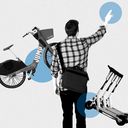The side effects of the electric scooter revolution

Published Date: 9/18/2019
Source: axios.com
One of the unintended consequences of the transportation revolution Silicon Valley is unleashing on city streets is a macabre new array of traffic jams, injuries and even deaths.The big picture: Cities have been built for personal cars for a century, and they are unprepared to manage the new modes of transportation that are rapidly gaining popularity.Case in point: After many, many scooter rides in D.C., I fractured my elbow on Sunday when I collided into the sideview mirror of a parked car while riding a Bird scooter.After my fall, I visited George Washington University Hospital where a radiologist told me the ER sees 1 or 2 scooter injuries per week.A Bird spokesperson told Axios the company has worked with riders and cities to promote safety, including adding an in-app tutorial for riders, launching a 100-city tour to collaborate with local officials on policies, and giving away 65,000 free helmets to date."I don’t blame so much the scooters or the bikes, but I blame cities that continue to be organized primarily around the car."Richard Florida, an urbanist at the University of TorontoThe side effects:1 electric scooter rider was injured for every 5,000 scooter trips, per a 3-month CDC study in Austin. About half of the total number of injured riders sustained head injuries. A Consumer Reports investigation counted 8 scooter-related deaths as of June 2019.Yes, but: "In 2018 alone, automobiles killed over 6,200 pedestrians in this country," Harvard's David Zipper notes in CityLab.Scooters are giving rise to new types of crime as well. There are Instagram accounts dedicated to defacing and destroying them. And criminals have used scooters to lure the freelancers who track and charge them into unsafe areas to rob or attack them, reports The Verge.Uber and Lyft, the leaders of the transportation revolution, have admitted that ride-hailing is contributing to traffic congestion in cities.And there's an all-out war for curb space in cities, with dockless scooters and bikes parked with abandon and autonomous delivery robots rolling alongside pedestrians, writes Axios' Kim Hart.Some cities, including Davis, Boulder and Virginia Beach, have responded by banning scooters — at least for now. But that's an imperfect solution, experts say.Tech giants will keep lobbying to enter new cities — and their track record has been strong so far. Think of all the cities that tried to keep Uber and Lyft out, but eventually caved.Companies will also keep innovating and come out with more new ways of getting around. Uber says it plans to put flying taxis in some cities in the next few years, Axios' Joann Muller reports.Better solutions might be for cities to have places to park and dock e-scooters and e-bikes, or add dedicated, protected lanes for different types of mobility going at different speeds, Florida says. Some, like D.C., have capped scooters' maximum speeds to make them safer.The bottom line: "It's a new world of different types of mobility, and we don’t really know what the effects are going to be," says Jessica Cicchino, vice president of research at the Insurance Institute of Highway Safety, which is working with GW on a scooter injury study. "There do seem to be benefits, but now we have to see what can we do policywise."